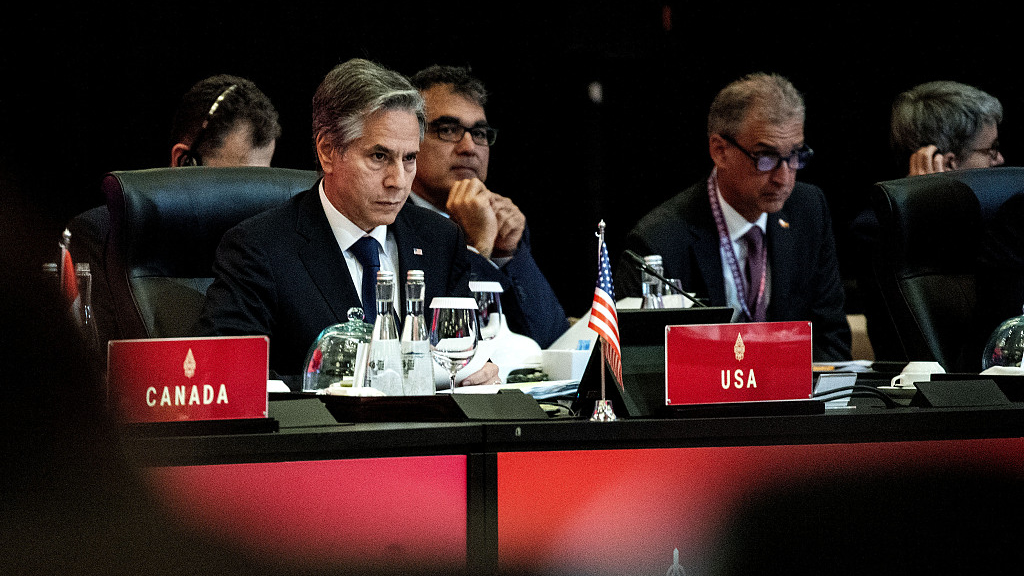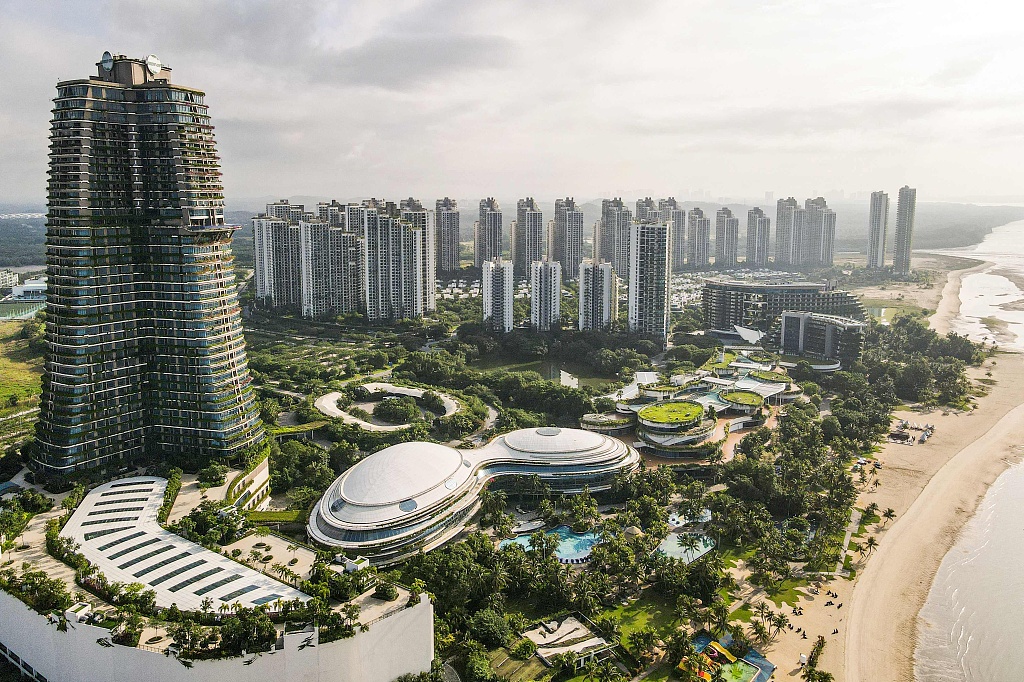
U.S. Secretary of State Antony Blinken (L) attends a meeting at the G20 Foreign Ministers' Meeting in Nusa Dua on the Indonesian resort island of Bali, July 8, 2022. /VCG
U.S. Secretary of State Antony Blinken (L) attends a meeting at the G20 Foreign Ministers' Meeting in Nusa Dua on the Indonesian resort island of Bali, July 8, 2022. /VCG
Editor's note: John Wight is a writer and political commentator. He is the author of Edinburgh Trilogy. He has also written a memoir, Dreams That Die, recounting his experience of Hollywood and participation in the U.S. antiwar movement in the run-up to the war in Iraq. The article reflects the author's opinions and not necessarily the views of CGTN.
Antony Blinken is clearly laboring under the misconception that he is the world's secretary of state rather than the U.S. secretary of state. How else to explain his repeated attempts to lecture Beijing over its relations with Moscow?
The most recent instalment of Blinken's behavior in this regard came at the G20 Foreign Ministers' Meeting in Indonesia. The New York Times reports that during his bilateral meeting with Chinese State Councilor and Foreign Minister Wang Yi, Blinken expressed his concern with China's "alignment with Russia." After the meeting, which lasted more than five hours, Blinken briefed reporters, during which he dismissed Wang's assertion that China is neutral when it comes to the Russia-Ukraine conflict.
Not satisfied with that, Blinken declared that he "tried to convey to the state councilor that this really is a moment where we all have to stand up," and that when it comes to the conflict in Ukraine, "There is a clear aggressor. There is a clear victim."
Wang Yi is of course by now used to being on the receiving end of these jeremiads from Blinken, and with customary alacrity placed this one in the proper context of the "China-phobia" that is currently driving Washington's relations with Beijing.
One here is reminded of one of the most seminal encounters in history — an exchange between a Roman delegation and the Carthaginian senate which set in train the direction of travel of human affairs for centuries thereafter. The Roman delegation had been dispatched to Carthage after the Roman senate received news of the fall of the ancient Iberian city of Saguntum (modern-day Sagunto) in 219 BC to the famed Carthaginian general Hannibal.
The Romans claimed Saguntum as one of their protectorates and in his classic account of the event, Greek historian Polybius reveals that the Romans gave the Carthaginians two options: "Either they must give up Hannibal and the members of his Council or war would be declared."
The Carthaginians refused, and the war threatened by the Romans ensued.
Today, we have U.S. Secretary of State Blinken demanding that either Beijing gives up Moscow — albeit metaphorically — or face incurring displeasure of Washington, the Rome of our time. It's the same imperial arrogance that accompanies any empire, established in the name not of peace or prosperity but war and exploitation.
As with Rome's animus toward Carthage, U.S. animus toward China is not over anything bad that China has done or is doing; it is over China's success and surefootedness on the world stage and its growing influence due to that success. Rome felt threatened by Carthage's growing prosperity; Washington feels threatened by Beijing's.
The key difference between Beijing's and Washington's engagement with the world is the difference between partnership and domination. Where the U.S. seeks to dominate, China seeks to cooperate. Where the U.S. has a policy of interfering in the internal affairs of other countries in violation of their sovereignty, China has a policy of not interfering in the internal affairs of other countries out of respect for their sovereignty.
The landmark Belt and Road Initiative has knitted together large swathes of the Global South, reflected in a staggering array of infrastructure and development projects to the tune of $1.8 trillion as of 2021, according to China's Ministry of Commerce.

A general view of Carnelian Tower (L) and condominiums at Forest City, a development project launched under China's Belt and Road Initiative, in Gelang Patah in Malaysia's Johor state, June 16, 2022. /VCG
A general view of Carnelian Tower (L) and condominiums at Forest City, a development project launched under China's Belt and Road Initiative, in Gelang Patah in Malaysia's Johor state, June 16, 2022. /VCG
Meanwhile, when it comes to Beijing's relationship with Moscow, the Center for Strategic and International Studies says that the conflict in Ukraine, instead of arresting relations, has strengthened them, cohering as they do around a "fundamentally similar view of the United States as a primary strategic threat."
Only those who've been asleep for the past few decades could possibly disagree with this assessment. Washington's role in fanning instability in China's Hong Kong region via the work of U.S. non-government organization the National Endowment for Democracy is a case in point, as is the worrying departure from the one-China principle when it comes to Taiwan in recent years.
As I have written elsewhere, where Russia is concerned, NATO's expansion eastward and in particular Ukraine being used as a cat's paw of Washington and its allies presented a clear strategic threat to Russia's security.
Blinken knows all this perfectly well, of course, which is why his protestations over Beijing's relations with Moscow fall into the category of the disingenuous.
Carthage's destruction after the Third Punic War (149-146 BC) left the world naked and trembling at the feet of a Roman Empire whose lust for power and domination was unparalleled and could never be satiated, resulting finally in its inevitable decline. Today's "Washington Empire" is likewise built on foundations of greed and lust for power. As for the democracy and human rights it purports to represent, these are but the flowery curtains behind which the savage beast of hegemony resides.
Russian President Vladimir Putin is not a modern-day Hannibal, but sadly it does appear that Blinken believes himself to be Rome's Scipio Africanus.
(If you want to contribute and have specific expertise, please contact us at opinions@cgtn.com. Follow @thouse_opinions on Twitter to discover the latest commentaries in the CGTN Opinion Section.)

